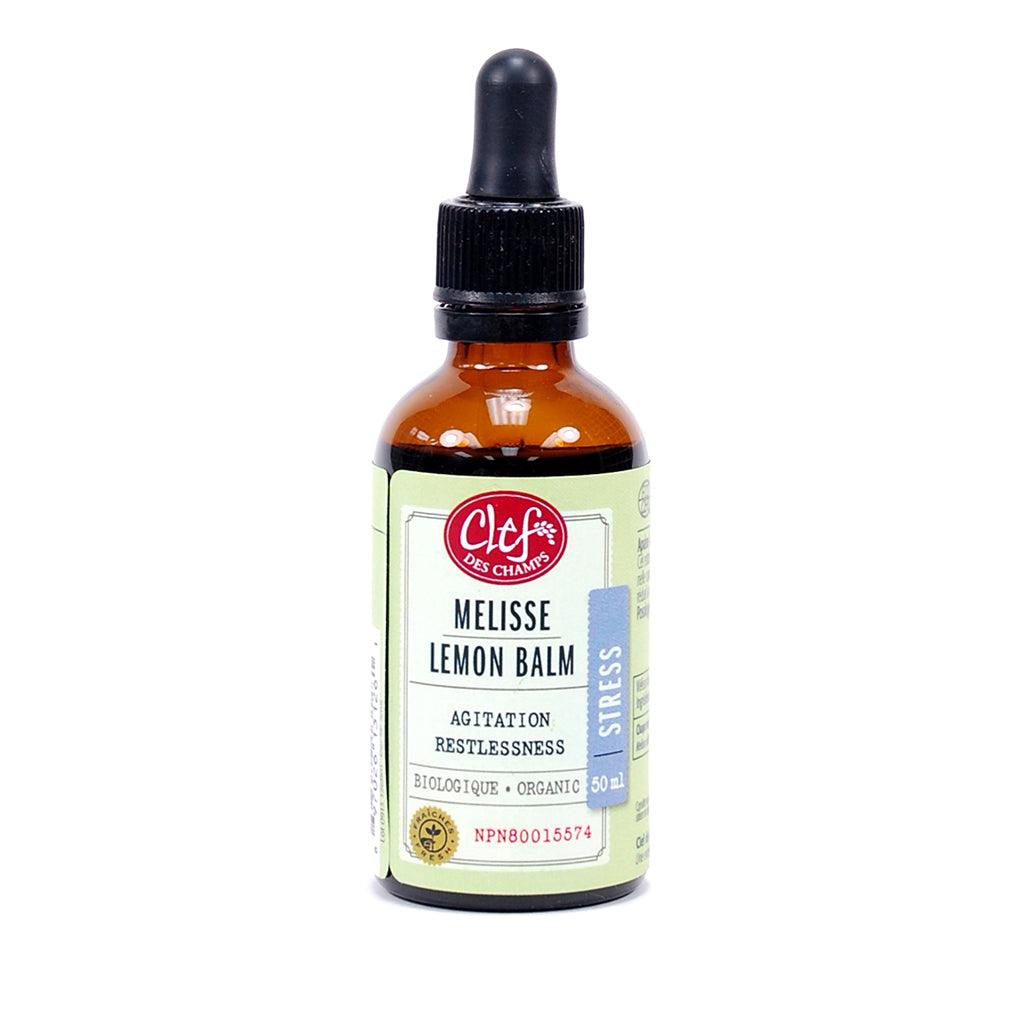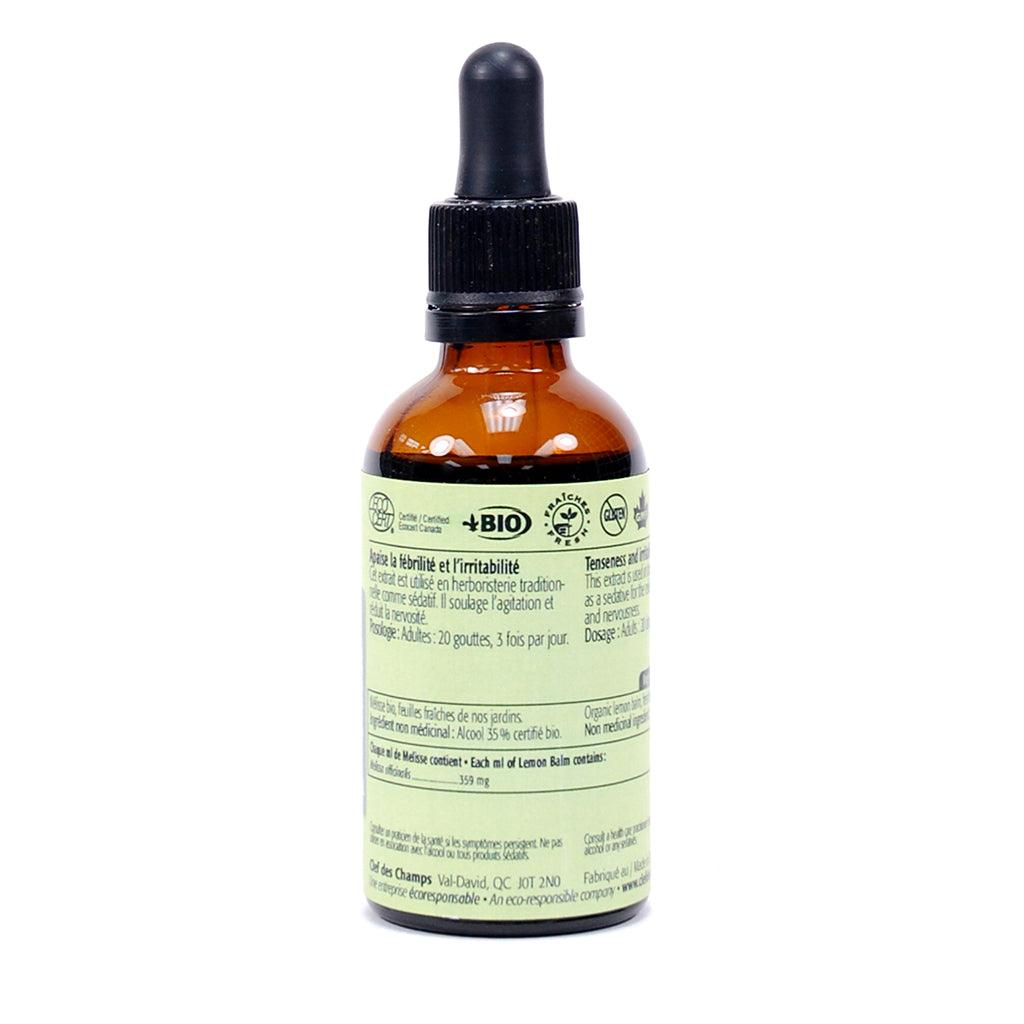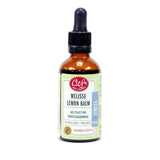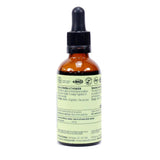



Lemon balm tincture organic
- 18.99$
- 18.99$
- Price per unit
- by
This extract is used in traditional herbalism as a sedative. It relieves restlessness and reduces nervousness.
Preparation of Lemon Balm organic tincture
- Fresh plants are chopped and macerated in organic alcohol.
- The preparation is stirred daily for 30 days, then pressed, decanted and sieved.
- No additives, colorants or preservatives
- No added sugar, gluten-free, soy-free, non-GMO, non-irradiated
Format of the Lemon balm organic tincture
- Amber glass bottle with dropper - 50 ml
Indications of Lemon balm organic tincture
Nervous system Insomnia, nervous system disorders, anguish, anxiety, nervousness, stress, hyperactivity, mania, mood disorders, melancholiafever, Alzheimer's disease, high blood pressure, heart palpitations
Digestive system Weak stomach, nervous indigestion, bloating, dyspepsia, spasm, flatulence, gastric acidity
External use Herpes labialis, shingles
Mode of action of Lemon balm organic tincture
Lemon balm's active ingredients are mainly found in its leaves and the essential oils extracted from them. Its volatile oils (neral, geranial, citronellal) confer digestive, antiviral, antibacterial and antifungal properties.
Lemon balm contains phenolic acids (including rosmarinic acid) with antioxidant properties, flavonoids and tannins with sedative, antispasmodic and calming effects on the central nervous system (CNS). Rosmarinic acid appears to have a hypothyroid effect.
Some clinical studies seem to demonstrate lemon balm's effects on mood and on cognitive and attention disorders in Alzheimer's disease, thanks to its action on acetylcholine production or release.
Lemon balm is still held in high esteem by phytotherapists. Its qualities as a nerve tonic and sedative without narcotic overtones are appreciated. Lemon balm is not habit-forming and does not restrict normal functioning.
We also value lemon balm for its effects on mood, character and emotions. As a nervous system plant that acts on both the emotional and physical levels, lemon balm is a great help to people who are tense, stressed and at a loss for direction.
It brings clarity of vision, helps to focus on what's essential and to sort things out. Lemon balm promotes detachment and serenity.
Favorable associations of Lemon Balm organic tincture
OAT infusion for insomnia and nervous disorders. Drink 1 liter daily.
MILLEPERTUIS tincture in cases of stress, anxiety, melancholymood disorders. Take 15 drops, 1 or 2 times a day.
VALERIANE tincture for sleep disorders. Take 25 drops at bedtime.
CAMOMILE infusion for stomach irritation. Drink 1 liter a day.
PURIFISANG capsules or infusion for herpes. Take 3 capsules, 1 or 2 times a day.
NERVOSITHE capsules for nervous disorders. Take 3 capsules, 1 or 2 times a day.
Traditional uses :
The Arabs of the 10th century were among the first to popularize the use of lemon balm. In the Middle East, it was used for mental disorders, treating epilepsy, lethargy and melancholy. Lemon balm was considered an excellent cordial plant. In the 16th century, Paracelsus held lemon balm in the highest esteem, believing it could even restore life! The monks of the 17th century made lemon balm their plant of choice: Eau des Carmélites, Chartreuse and Benedictine contain lemon balm. Eau de Mélisse des Carmes, a blend of different plants and lemon balm, was (and still is) used to treat nervousness and agitation, stress, anxiety, melancholymood disorders.
Certification :
Certified organic under independent supervision (Ecocert Canada)
Recognized as organic by the Conseil des appellations agroalimentaires du Québec (CAAQ)
Manufactured according to Good Manufacturing Practices
References :
1 Mc Guffin Michael et al. Botanical Safety Handbook. Boca Raton: CRC Press; 1997.
2 Blumenthal, Goldberg, Brinckmann. Herbal Medicine: Expanded Commission E Monographs. Newton: Integrative Medicine Communications; 2000.
3 Leung Albert Y., Foster Steven. Encyclopedia of Common Natural Ingredients Used in Food, Drugs and Cosmetics.2nd ed. New York: Wiley-Interscience Publication; 1996.
4 ESCOP. Monographs on the Medicinal Uses of Plant Drugs. Exeter: Centre for Complementary Health Studies; 1996.
5 Wichtl Max. Herbal Drugs and Phytopharmaceuticals. Stuttgart: Medpharm Scientific Publishers; 1994.
6 Who. WHO monographs on Selected Medicinal Plants. Volume 2. World Health Organization. Geneva; 1999.
7 Chandler Frank. Herbs-Everyday Reference for Health Professionals. Ottawa: Canadian Pharmacists Association; 2000.
8 Winston David, Kuhn Merrily A. Herbal Therapy & Supplements. Philadelphia: Lippincott; 2000.
9 Chevallier, Andrew. Encyclopedia of Medicinal Plants. Montreal: Reader's Digest Selection, 1997.
10 Moerman Daniel E. Native American Ethnobotany. Portland: Timber Press; 1999.
If you find yourself in a depressive situation or feel you need psychological support, we recommend that you choose one of the following two resources: Depression and Suicide
Related products
- 18.99$
- 18.99$
- Price per unit
- by
- 18.99$
- 18.99$
- Price per unit
- by
- 18.99$
- 18.99$
- Price per unit
- by
- 18.99$
- 18.99$
- Price per unit
- by
- 18.99$
- 18.99$
- Price per unit
- by
- 18.99$
- 18.99$
- Price per unit
- by
- 18.99$
- 18.99$
- Price per unit
- by
- 18.99$
- 18.99$
- Price per unit
- by
- 18.99$
- 18.99$
- Price per unit
- by
- 18.99$
- 18.99$
- Price per unit
- by
Recently viewed products
- 18.99$
- 18.99$
- Price per unit
- by
- 18.99$
- 18.99$
- Price per unit
- by
- 18.99$
- 18.99$
- Price per unit
- by
- 18.99$
- 18.99$
- Price per unit
- by
- 18.99$
- 18.99$
- Price per unit
- by
- 18.99$
- 18.99$
- Price per unit
- by
- 18.99$
- 18.99$
- Price per unit
- by
- 18.99$
- 18.99$
- Price per unit
- by
- 18.99$
- 18.99$
- Price per unit
- by
- 18.99$
- 18.99$
- Price per unit
- by
- Choosing a selection causes the entire page to be updated.


